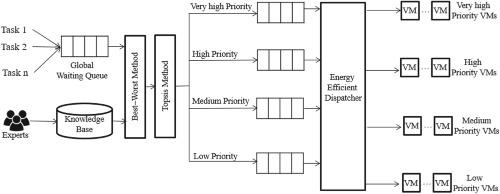当前位置:
X-MOL 学术
›
Int. J. Commun. Syst.
›
论文详情
Our official English website, www.x-mol.net, welcomes your
feedback! (Note: you will need to create a separate account there.)
An energy‐efficient task‐scheduling algorithm based on a multi‐criteria decision‐making method in cloud computing
International Journal of Communication Systems ( IF 1.7 ) Pub Date : 2020-03-09 , DOI: 10.1002/dac.4379 Reihaneh Khorsand 1 , Mohammadreza Ramezanpour 2
International Journal of Communication Systems ( IF 1.7 ) Pub Date : 2020-03-09 , DOI: 10.1002/dac.4379 Reihaneh Khorsand 1 , Mohammadreza Ramezanpour 2
Affiliation

|
The massive growth of cloud computing has led to huge amounts of energy consumption and carbon emissions by a large number of servers. One of the major aspects of cloud computing is its scheduling of many task requests submitted by users. Minimizing energy consumption while ensuring the user's QoS preferences is very important to achieving profit maximization for the cloud service providers and ensuring the user's service level agreement (SLA). Therefore, in addition to implementing user's tasks, cloud data centers should meet the different criteria in applying the cloud resources by considering the multiple requirements of different users. Mapping of user requests to cloud resources for processing in a distributed environment is a well‐known NP‐hard problem. To resolve this problem, this paper proposes an energy‐efficient task‐scheduling algorithm based on best‐worst (BWM) and the Technique for Order Preference by Similarity to Ideal Solution (TOPSIS) methodology. The main objective of this paper is to determine which cloud scheduling solution is more important to select. First, a decision‐making group identify the evaluation criteria. After that, a BWM process is applied to assign the importance weights for each criterion, because the selected criteria have varied importance. Then, TOPSIS uses these weighted criteria as inputs to evaluate and measure the performance of each alternative. The performance of the proposed and existing algorithms is evaluated using several benchmarks in the CloudSim toolkit and statistical testing through ANOVA, where the evaluation metrics include the makespan, energy consumption, and resource utilization.
中文翻译:

云计算中基于多准则决策方法的节能任务调度算法
云计算的迅猛发展已导致大量服务器消耗大量能源和碳排放。云计算的主要方面之一是它调度用户提交的许多任务请求。在确保用户的QoS偏好的同时,最小化能耗对于实现云服务提供商的利润最大化以及确保用户的服务水平协议(SLA)非常重要。因此,除了执行用户的任务之外,云数据中心还应通过考虑不同用户的多种需求来满足不同的应用云资源标准。将用户请求映射到云资源以在分布式环境中进行处理是一个众所周知的NP难题。为了解决这个问题,本文提出了一种基于最佳最差(BWM)和基于与理想解决方案相似性的订单偏好技术(TOPSIS)方法的节能任务调度算法。本文的主要目的是确定哪种云调度解决方案更重要。首先,决策小组确定评估标准。此后,由于所选标准具有不同的重要性,因此将应用BWM过程为每个标准分配重要性权重。然后,TOPSIS使用这些加权标准作为输入,以评估和衡量每个替代方案的性能。使用CloudSim工具包中的多个基准以及通过ANOVA进行的统计测试,对所提出和现有算法的性能进行了评估,评估指标包括制造期,能耗,
更新日期:2020-03-09
中文翻译:

云计算中基于多准则决策方法的节能任务调度算法
云计算的迅猛发展已导致大量服务器消耗大量能源和碳排放。云计算的主要方面之一是它调度用户提交的许多任务请求。在确保用户的QoS偏好的同时,最小化能耗对于实现云服务提供商的利润最大化以及确保用户的服务水平协议(SLA)非常重要。因此,除了执行用户的任务之外,云数据中心还应通过考虑不同用户的多种需求来满足不同的应用云资源标准。将用户请求映射到云资源以在分布式环境中进行处理是一个众所周知的NP难题。为了解决这个问题,本文提出了一种基于最佳最差(BWM)和基于与理想解决方案相似性的订单偏好技术(TOPSIS)方法的节能任务调度算法。本文的主要目的是确定哪种云调度解决方案更重要。首先,决策小组确定评估标准。此后,由于所选标准具有不同的重要性,因此将应用BWM过程为每个标准分配重要性权重。然后,TOPSIS使用这些加权标准作为输入,以评估和衡量每个替代方案的性能。使用CloudSim工具包中的多个基准以及通过ANOVA进行的统计测试,对所提出和现有算法的性能进行了评估,评估指标包括制造期,能耗,











































 京公网安备 11010802027423号
京公网安备 11010802027423号